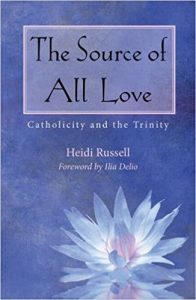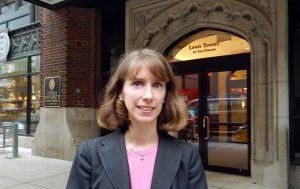The Source of All Love: Catholicity and the Trinity is a recently released book by IPS faculty member Dr.Heidi Russell. This new book is a fresh approach to an age-old doctrine brings together theology and science to reveal an active, conscious, omnipresent power of Love that never began, never will end, and guides the universe and everything in it. The key to spiritual evolution is awareness and participation.
Dr. Heidi Russell inspires us to see that Trinity is not only the ground of our being but the goal of an evolving universe. She shows how the idea of catholicity – a sense of wholeness – orients us toward universality and motivates us to turn together as one. It is Trinity that empowers all of life to become whole and unified in love. This is, in truth, what we always are and what we will become.
Dr. Russell herself explains: “I wrote the book, because in my experience in pastoral ministry, many people tend toward a ditheistic, at the very least, if not a tritheistic image of God. In other words, they tend to relate to the Father and Son (ditheism) or the Father, Son, and Spirit (tritheism) as separate, individual beings. Using a primary metaphor of love rather than being helps people relate to the Trinity in a way that maintains our monotheistic belief, which is to say, our belief in one God, not two or three gods.”
Reviews
“A wonderful contribution to understanding the Trinity in an age of science.” —Ilia Delio
“Highly creative. . . Professor Heidi Russell has emerged as one of the finest theologians whose focus is on the integration of the best of the Christian tradition with relativity and quantum physics theory.”—Harvey D. Egan, SJ, Boston College
“If Rahner is right that the Trinity must be a personal experience before it can be a meaningful doctrine, Heidi Russell in this book offers an interpretation of doctrine that enables it to be experienced.”—Paul F. Knitter, author, Without the Buddha I Could Not Be a Christian
“Interpreting catholicity as wholeness, Russell finds instances of wholeness in quantum physics, the classical doctrine of the Trinity, the Scriptures, Church Fathers, the Trinitarian theology of Karl Rahner and still other contemporary Trinitarian philosopher/theologians. . . . for the typical undergraduate student and educated lay person, the vision of cosmic wholeness (the whole greater than the sum of its parts) is captivating.”—Joseph Bracken, Xavier University
**Content borrowed from Orbis Books publisher.

